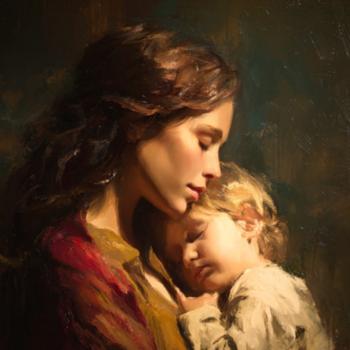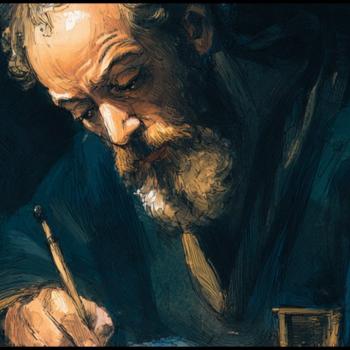
Saying 22: Jesus saw some infants who were being suckled. He said to his disciples: “These infants being suckled are like those who enter the Kingdom.” They said to him: “Shall we then become infants, to enter the Kingdom?” Jesus said to them: “When you make the two one, and when you make the inside as the outside, and the outside as the inside, and the upper as the lower, and when you make the male and the female into a single one, so that the male is not male and the female not female, and when you make eyes in place of an eye, and a hand in place of a hand, and a foot in place of a foot, an image in place of an image, then shall you enter [the kingdom].”
After affirming that it is only those who become like little children who can see or enter the Kingdom of God – as he does elsewhere in Thomas and also in the Canonical Gospels – Jesus makes one of the most blatantly non-dualistic sayings of them all.
First, let’s examine the initial statement where Jesus compares suckling infants to those who enter the Kingdom. As Biblical scholar FF. Bruce writes of this saying:
“This is an expansion of the canonical saying: ‘whoever does not receive the kingdom of God like a child shall not enter it’ (Luke 18.17; cf. Matthew 18.3). But the expansion suggests the abolition of sex distinction (cf. Sayings 4, 11, 106): as infants are devoid of sex awareness or shame, so should the disciples be. In the Gospel according to the Egyptians words like these are spoken by Jesus to Salome. We may recognize a Gnostic interpretation of Paul’s words: ‘there can be no male and female’ (Galatians 3.28). The replacement of physical eyes, hand and foot by corresponding spiritual members is probably a gloss on the saying in Mark 9.43-48 (cf. Matthew 5.29 f.; 18.8 f.), which similarly follows words about children.”[1]
This concept of becoming like children to enter the Kingdom has already been spoken by Jesus in this Gospel as well. For example, in our previous saying, and also back in saying 4 where Jesus told his disciples, “The man old in days will not hesitate to ask a small child seven days old about the place of life, and he will live.”
The point Jesus seems to emphasize repeatedly is that there is a simplicity to the Kingdom that we once knew and understood instinctively as small children that the World has stolen from us – again, as Jesus warns us against in our previous saying above – and our task is to become as wise and innocent as children again to re-learn the wisdom of the Kingdom that we have all since forgotten.
Again, this concept is repeated numerous times in the Canonical Gospels, as in Matthew 11:25 where Jesus says, “I thank you, Father, Lord of heaven and earth, because you have hidden these things from the wise and intelligent and have revealed them to infants.”
Jesus wants his disciples to understand that infants understand the Kingdom in ways we do not. So, when his disciples in this saying respond – as Nicodemus did in John 3:3 when Jesus told him he must be born again to see the Kingdom of God – by asking him, “Must we become infants to enter the Kingdom of God?”, he answers them with a curious riddle for them to decipher that specifically targets their need to overcome dualistic ways of thinking:
Jesus said to them: “When you make the two one, and when you make the inside as the outside, and the outside as the inside, and the upper as the lower, and when you make the male and the female into a single one, so that the male is not male and the female not female, and when you make eyes in place of an eye, and a hand in place of a hand, and a foot in place of a foot, an image in place of an image, then shall you enter [the kingdom].”
We’ve already seen Jesus refer to the necessary shift away from dualism to recognize the Oneness of all things before. For example, when he says that we must “make the two one” or “make the inside as the outside,” and that concepts of separation such as “male” and “female” have no place in the Kingdom, he’s essentially repeating what he has already told us in previous sayings.
For example, if you remember what he said in saying 3, “…the kingdom is within you, and it is outside of you,” then this concept is merely a review. The Kingdom of God obliterates the dualistic concepts of separation, and that includes ideas of being inside or outside. Because, if we are all One in Christ, then there is no separation – no outside, no up, no down, and no male or female.
The only problem I have with this translation is the part where Jesus is quoted as saying, “…and when you make eyes in place of an eye..” because it feels as if what should be said is, “…when you make an eye in place of eyes..”, moving from plural to singular [eye], not from singular to plural [eyes]. At least, it seems to me that it would make more sense for Jesus to remain consistent in his analogy that what we need to do is to move away from the idea of many towards the concept of the One. If so, then the saying would make more sense to stress our need to “make an eye in place of [many] eyes.”
Curiously, this passage appears to be referenced in the Second Epistle of Clement:
“For the Lord Himself, being asked by a certain person when his kingdom would come, said, “When the two shall be one, and the outside as the inside, and the male with the female, neither male or female. Now the two are one, when we speak truth among ourselves, and in two bodies there shall be one soul without dissimulation. And by the outside as the inside,” He meaneth this: by the inside he meaneth the soul and by the outside the body. Therefore, in like manner as the body appeareth, so also let thy soul be manifest by its good works. And by the male with the female, neither male nor female, he meaneth this; that a brother seeing a sister should have no thought of her as a female, and that a sister seeing a brother should not have any thought of him as a male. These things if ye do, saith He, the kingdom of my father shall come.”[2]
Some Thomas scholars may object slightly to Clement’s interpretation of this saying. But at least the saying is acknowledged as having been said by Jesus and is being taken seriously enough to provide commentary on for those who seek to follow the words of Christ.
Perhaps he is struggling to comprehend the saying within his own semi-dualistic framework, but at least he is making the effort to understand.
We should also note that It’s possible that what this commentary is referring to here is not this saying from Thomas, but from an almost identical one found in the Gospel of Peter. Either way, the saying was attributed to Jesus and is referred to in both of these early Christian writings as having been spoken by Jesus to his disciples.
When we compare what Jesus says here to his other non-dualistic statements in Thomas’s Gospel, we realize that he is not speaking metaphorically but in a more literal sense. There truly is no inside or outside to be seen because those are illusions created by our dualistic ways of seeing and thinking. Until we completely embrace the concept of our true Oneness with God and God’s true Oneness with us, and with all things, we cannot see the Kingdom of God with the fresh eyes of suckling infants who instinctively know this truth in a way that transcends knowing.
Simply put, once we realize that everything is One in Christ, we can truly see the Kingdom of God.
We must also recognize that artificial distinctions of male and female are illusions.
As John Dominic Crossan writes:
“You will recall from earlier that the Gospel of Thomas derided the idea of looking into the future for apocalyptic salvation. Instead, it advocated looking back to the past, not only to an Edenic moment before Adam and Eve sinned but to an even more primordial moment before they were split into two beings. Its gaze was not on a male but on an androgynous Adam, image of its Creator in being neither female nor male. And it was in baptism, precisely in the primitive form of nude baptism, that the initiant, reversing the saga of Genesis 1-3, took off ‘the garments of shame’ (Smith 1965-66) mandated for a fallen humanity and assumed ‘the image of the androgyne’ (Meeks). This theology, which is the basic unifying vision of the Gospel of Thomas, can be seen not only in Gospel of Thomas 22:1-4 but also in 21:1-2 and 37:1-2 and in all those sayings, such as 4:2, 11:2, 16, 23, 49, 75, 106, about being or becoming one, a single one, or a solitary (Klijn).” [3]
This aligns perfectly with what the Apostle said in one of his earliest epistles about our need to recognize that, now, in the Body of Christ, we have come to realize the truth about ourselves:
“There is neither Jew nor Greek, there is neither bond nor free, there is neither male nor female: for ye are all one in Christ Jesus.” [Gal. 3:28]
This supreme Oneness we experience in Christ eradicates all notions of separation: religious, ethnic, biological, etc.
Once we have seen the Kingdom we realize this is true. Or, as Jesus phrases it here, it is only when we realize it is true that we see the Kingdom.
[1] F.F. Bruce, Jesus and Christian Origins Outside the New Testament, p. 123-124
[2] Second Clement 12:2-6
[3] The Historical Jesus, by John D. Crossan, p. 267
**
We hosted our first INNER CIRCLE Zoom Session a few weeks ago. Here’s the replay for those of you who couldn’t make it. Hope we can meet all of you at the next one.
**

EVENTS 2022
*REIMAGINING FAITH – Tyler, TX – Oct. 8 REGISTER HERE>
*SOLA MYSTERIUM – Irvine, CA – Oct. 15 REGISTER FOR FREE>
*THE GOSPEL OF THOMAS (Class) – REGISTER WITH O.L.L.I. HERE>
**
Keith Giles is the author of the new bestseller, SOLA MYSTERIUM: Celebrating the Beautiful Uncertainty of Everything, available now on Amazon. Keith is also the host of Second Cup with Keith, a new solo podcast available now on the Ethos Radio App, for Apple and Android and on Spotify. Keith is also co-host of the long-running HERETIC HAPPY HOUR PODCAST.













